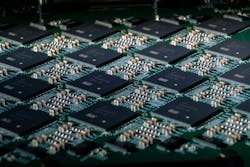Intel Says It Is Business as Usual for Manufacturing Operations
Intel said it is meeting most of its commitments to supply chips to customers despite challenges related to the rapid spread of the novel coronavirus. The Silicon Valley giant is meeting demand even as it struggles to get around the supply shortages that have dogged it in recent years.
Robert Swan, Intel's chief executive officer, said on Thursday that it remains business as usual for the company's vast manufacturing operations. He said that the company is filling more than 90% of orders on time. Intel has manufacturing, assembly, and test operations in Oregon, Arizona, California in the United States as well as China, Israel, and Southeast Asia. The chips produced by its fabs are vital parts to the electronics industry.
"They are working hard to make sure you can continue to be successful," Swan said in a letter to customers and partners.
Intel, as the world's top purveyor of chips used in personal computers and data centers, plays one of the leading roles in electronics market. It is trying to reassure customers as the spreading of the coronavirus upsets markets and upends business. The fallout could curb spending by consumers and businesses. But the uncertain demand for chips could also work in its favor as it has struggled to meet orders from PC manufacturers.
Intel has been suffering from supply constraints over the last year due to the production of chips based on its latest 10-nanometer node and its deal to supply modems used in Apple's iPhone. Intel has been spending billions of dollars to get through the shortages, which has been hurting its business since the second half of 2018. Lenovo and Dell have complained that the processor shortage has cramped the personal computer market.
Intel plans to increase spending on its production plants to $17 billion in 2020, up from $16.2 billion in 2019, according to Intel's chief financial officer George Davis. He added on the company's earnings conference call in January that it would be unable to meet surging demand in 2020. Intel is also upgrading its production plants to fill demand for chips based on 10-nanometer, which has been bedeviled by increasingly long delays.
The Santa Clara, California-based company lost its lead in advanced chip production as TSMC, the world's largest contract chip manufacturer, has started selling chips based on the 7-nanometer node to Advanced Micro Devices and other rivals. Intel has blamed the delays on defects in its process for producing chips based on 10-nanometers. It plans to roll out server processors based on the 10-nanometer node before the end of the year.
Intel, which has started contracting out more of its overall production over the last year, plans to increase spending to solve supply shortages by the end of 2020 or early 2021, Swan said. "We're continuing to add capacity so we're not constraining our customers growth," he added on the company's conference call with analysts in January. "Our near term challenge is working with our customers to support their desired product mix."
Davis, Intel's chief financial officer, said that it has been business as usual for the Silicon Valley company despite the spread of the deadly virus. He said that the supply shortage has actually softened the blow to its business. Lisa Su, chief executive of rival AMD, said on the company's earnings conference call in January that it has been unharmed by the virus but that worsening uncertainty could dent its business in the first quarter of 2020.
Other vendors are also raising red flags. Broadcom said that the uncertainty surrounding the insidious virus could delay the recovery in the semiconductor industry, which slipped sharply in 2019. Broadcom, which has been hammered by the trade war between the US and China, said its chip business has been improving and that it has not yet been hurt by the outbreak. But the uncertainty pushed it to pull its annual sales forecast.
The outbreak of the virus could lead to "significant contraction" in global semiconductor sales, according to market researcher IDC. The slowing of supply chains, the mounting uncertainty for device manufacturers, and deepening panic in the population could cut sales by more than 5% in 2020. Mario Morales, program vice president for semiconductors at IDC, warned it is impossible to forecast the pace of the industry's recovery.
About the Author
James Morra
Senior Editor
James Morra is the senior editor for Electronic Design, covering the semiconductor industry and new technology trends, with a focus on power electronics and power management. He also reports on the business behind electrical engineering, including the electronics supply chain. He joined Electronic Design in 2015 and is based in Chicago, Illinois.

